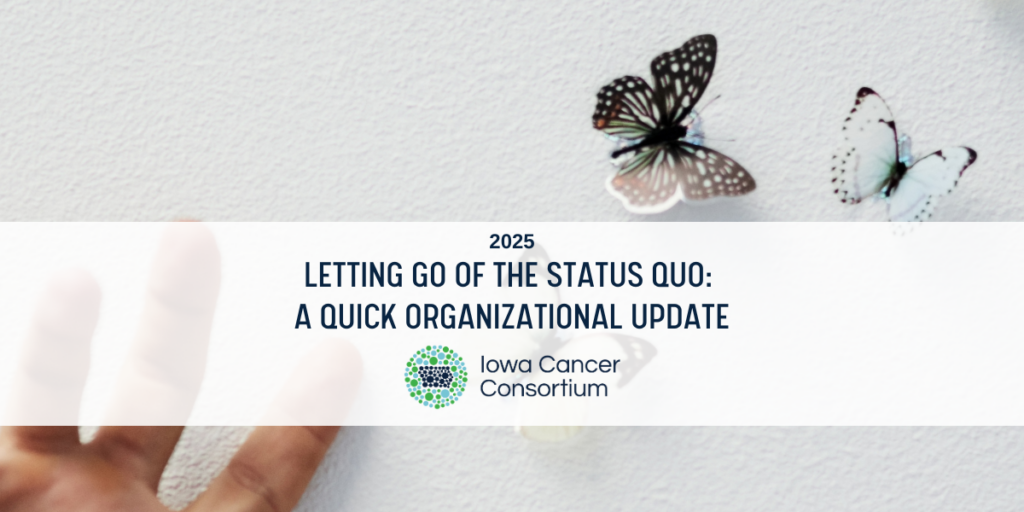Letting go of the status quo: A quick organizational update

|
Dear members and partners, Years ago, our staff co-created what we refer to as our Rules of Engagement. These “rules” guide us to work together in our most authentic, open, and people-centered way. We check in with our rules of engagement regularly and update them as needed. One rule that has not changed across all these years is to “Let go of the status quo.” |
|
|
|
|
Letting go of the status quo is critical because it allows us to respond to the most pressing needs and efforts at hand. It gives us permission to be creative and helps us more quickly move away from the things that are not serving the Consortium or cancer control in Iowa. You, Consortium members, have also told us that flexibility and responsiveness are some of the things you appreciate most about the Consortium. Often, letting go of the status quo simply means embracing change. I don’t think it will surprise you to know that the past year has brought a steady stream of change for our organization. I’d like to tell you about some of those changes here, so you know what to expect and look forward to in the year ahead. Reduced staffing. (Requesting your patience!!) We’ve always had a smallish staff, but current situations have us leaner than ever. You all remember that CDC Public Health Associate (PHAP) Bri McNulty’s time was cut short with us in March. The CDC PHAP program has likely ended for the foreseeable future, which means this resource that has been a tremendous asset to our staffing will no longer be available. Additionally, you likely know by now that Communications and Outreach Specialist Liz Orton has started graduate school in Canada. Thankfully, Liz has graciously agreed to contract with us through the end of October, but we won’t rehire her position until we know that future funding is more secure. (You may remember that last time I emailed you, we were relieved to have learned that funding would come per usual for FY26. But the status of the CDC Comprehensive Cancer Control Program and the state funding tied to it is still very uncertain beyond this fiscal year.) You may not know that our own Kelly Rollins had a breast cancer diagnosis this year and is currently undergoing treatment (shared with her permission). She is thankfully doing well, and we are trying to keep the show running while giving her the space and time she needs away from work to rest and recover. It won’t surprise you to know that she continues to keep balls in the air, plates spinning, and all of the other analogies for managing a lot of things. But we know there will be times when she needs her teammates to juggle some things for her, and we’re ready for that. If you’re keeping track, this is quite a dent in a small team. This means it is inevitable that we will find ourselves obligated to say “no” to things we would normally say “yes” to, occasionally responding just a little slower, and asking for your patience at times. Neither Kelly R. nor Liz will be at the Iowa Cancer Summit this year, so we’ve already had to start asking for extra help from partners. Incredibly, our strategic planning process (more about that below!) told us that Iowa Cancer Consortium members and leaders want to be leaned on more – you’re ready and excited to help. And wow, has that been clear in the ways people have stepped up to make the Summit happen (you know who you are – THANK YOU). Though we may still need everyone’s grace and patience on Summit day, we will have so many wonderful extra hands making things work. Thank you. Changes ahead for workgroups. In our most recent member survey, one place you told us we can cut back is on workgroups. We also know that making connections and sharing resources are some of the key reasons you participate in the Consortium. So, our staff is looking at how we do workgroups and developing a plan to maximize the networking and resource sharing, while minimizing the less helpful pieces. Rest assured, changes will not be made without the input and guidance of workgroup chairs and members. Stay tuned for more information. A new strategic plan. While we must reduce our scope in some ways, we are sharpening our focus on the things you’ve told us are most important. And we have a new strategic plan to help us do that. This plan was developed from more than a year’s worth of groundwork and data collection, including a member survey, member and board feedback sessions, and multiple sessions between staff and planners. Like the Iowa Cancer Plan, it is likely that not all the goals and strategies within this plan will be “accomplished.” Rather, it is meant to provide direction for making progress towards the goals and strategies that Iowa Cancer Consortium members, board, and staff feel are most important right now. Like our organization itself, this plan is meant to be nimble and flexible as contexts and evidence change. Our new strategic plan prioritizes
All while focusing on the crosscutting areas of behavioral health risk factors/prevention, screening and early detection, environmental risk factors, reducing barriers to healthcare access, and policy and advocacy. This plan will be our guidepost as we navigate inevitable change over the next few years to ensure we are focusing where you want us to, even in tight times. And for you deep strategic plan nerds (I am one of you!!!!), take a look at the full plan here and let me know what you think! Be well, friends! And always, always reach out with ideas, questions, needs, or just to say hi. Can’t wait to see many of you at the Iowa Cancer Summit. |
|
|
|
|
Kelly W. Sittig |


